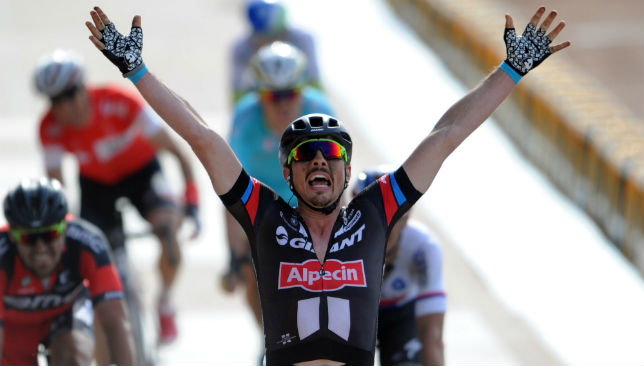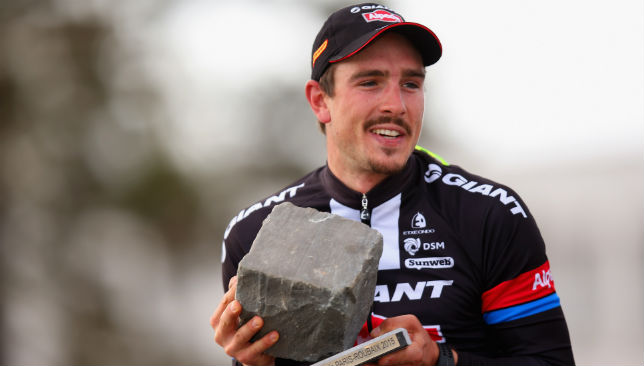
One moment can change everything for an athlete and John Degenkolb knows this better than most.
This time last year, the cyclist was an established force at Team Giant-Alpecin and eager to build on a career-best 2015 season which had begun with second place in the general classification at the Dubai Tour.
With power coursing through him during the spring classics, the sprinter had surged his way to epic triumphs at both Milan-San Remo and Paris-Roubaix – becoming the first German in 119 years to conquer the ‘Hell of the North’.
It was not wishful thinking to believe the kilometres put into his legs during the preparatory period in Spain could propel him towards a maiden-stage victory at that year’s Tour de France or build on the points classification already won at the 2014 Vuelta a Espana.
An errant driver was then to derail these ambitions. Degenkolb was one of six Giant riders hit by a car which careered into oncoming traffic on January 23.
Cuts were suffered to his thigh, forearm and lips, while he also came close to losing his left index finger – a career-threatening development.
Another charge at the races he had just dominated was impossible. Simply to take part in 2016’s edition of the Tour – his sport’s premier event – was a huge achievement after he had only returned at Rund um den Finanzplatz in Frankfurt on May 1.
Fast forward to this month and the 28-year-old now heads into the fourth edition of the Dubai Tour on Tuesday with both new employers in Trek-Segafredo and fresh questions posed about whether the high points of two years ago can be repeated.

“Of course, the accident was in the beginning of the season – it was a big setback,” Degenkolb tells Sport360.
“But, my biggest memories of it were the time when I fought my way back. I had a great comeback riding the Tour de France [highlighted by coming fourth in the mass sprints both on stage 14 and 16] and also winning races afterwards again – it was great to see and also motivating for the future.”
Treatment blocks in Valencia and Hamburg got him back on the road, although the injury to his hand has provided a nuisance during the high-octane sprinting environment whereby every advantage – or disadvantage – counts.
After such a harrowing incident, is it a bigger mental or physical challenge to come back in winning condition?
“It was both,” Degenkolb replies.
“Both parts are crucial to be successful in cycling. “If you have the physical ability, you also have to be mentally strong.”
Degenkolb isn’t the only new face at a Trek team that has been reshaped following the retirement of legendary Swiss rider Fabian Cancellara, with two-time Tour winner Alberto Contador the other headline arrival. The pair will carry the hopes of the outfit this term.
The German will gun for sprint success and his iconic colleague will aim for general classification glory. They have been warming up together in Spain for the last month, although Contador will not take part in Dubai and has not been confirmed for next month’s Abu Dhabi Tour.
What have Degenkolb’s first impressions been of his illustrious – and controversial – team-mate?
He says: “We had a couple of rides together. He is a very professional rider, which inspires the whole team. It gave all of us the right spirit and motivation to push your limits. it was great to have him in the training camp.
“In general, I think the team is going really well. It is a team with the right balance. “We have some fun, but also we can be professional riders.”
Here we go. Please welcome the @TrekSegafredo race kit. Now the raceseason 2017 is ON. We are ready. In style #dege pic.twitter.com/6XvNHaTg2O
— John Degenkolb (@johndegenkolb) January 13, 2017
Doubts have grown about 34-yearold Contador’s enduring prowess after an underwhelming 2016. The Spaniard withdrew while down in 20th place before the ninth stage of the Tour and finished more than four minutes behind winner Nairo Quintana in fourth at the Vuelta.
Despite these setbacks, Degenkolb had no doubts about his colleague’s retained ability to challenge for cycling’s elite prizes.
He says: “I think he [Contador] is very motivated and still hungry to be successful. I don’t doubt to see him even winning the Tour and being really successful there.”
A promising run in Dubai will lay the foundations for another shot at the spring classics and Grand Tours. Further motivation is found in the fact 2017’s Tour begins on home soil in Dusseldorf, on July 1.
“I wouldn’t call it a massive target, but it is a big thing,” Degenkolb states. “I’m really looking forward to starting the Tour in my home country – it is on my bucket list. “[But] For me, the Tour is still very far away. Right now, I am only focusing on the spring classics, of course.”
The Dubai Tour evokes vivid memories for Degenkolb. He produced one of the race’s iconic moments in 2015, collapsing exhausted after straining his way to victory up Hatta Dam’s sharp climb.
“It was kind of painful,” he jokes. “That is the biggest memory I have of that. The nicest thing would be to repeat that and to have a good performance there again. I have a great team to support me.”
A fresh start and new colleagues means this week represents a trip into the unknown against fellow sprint kings Mark Cavendish and Marcel Kittel. No matter how it goes, a rider who has been through so much is refusing to countenance any definite conclusions being drawn.
He says: “Of course, the main goal is just to kick off the season and get in the kilometres. But winning a stage is always nice, especially in the beginning of the season.
“Then, you gain the confidence for the next races. But if not, I think we should not be disappointed – plenty of races are to come.”